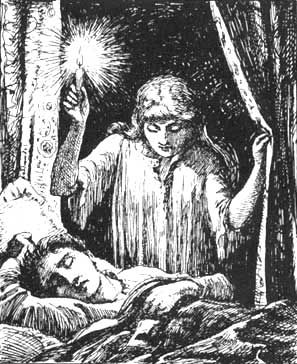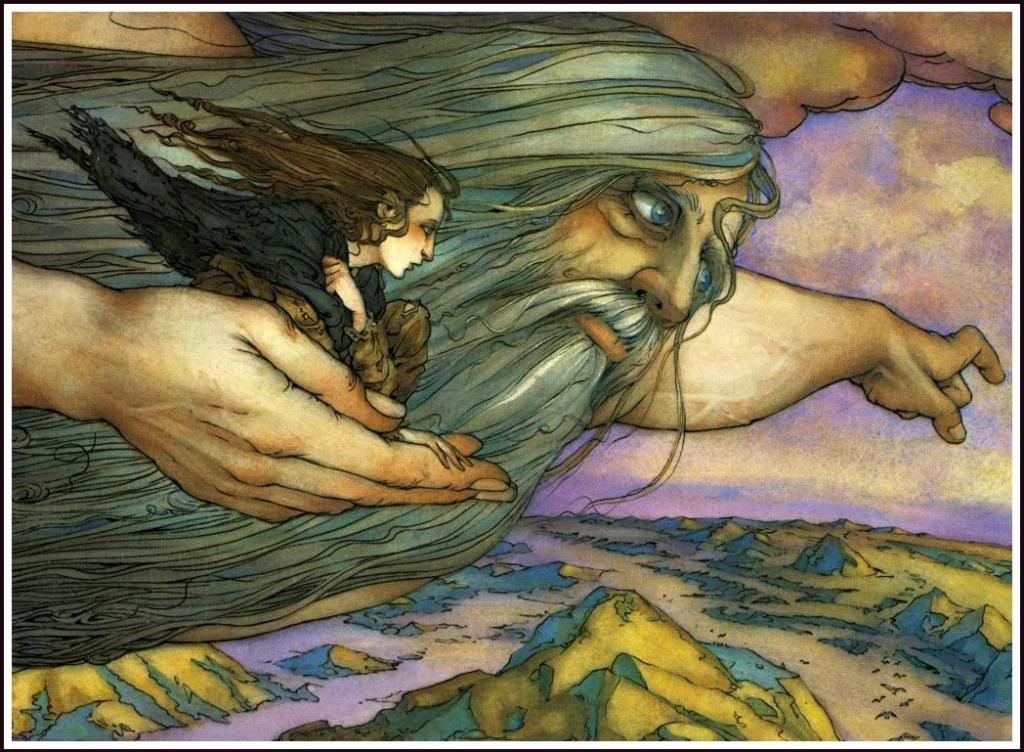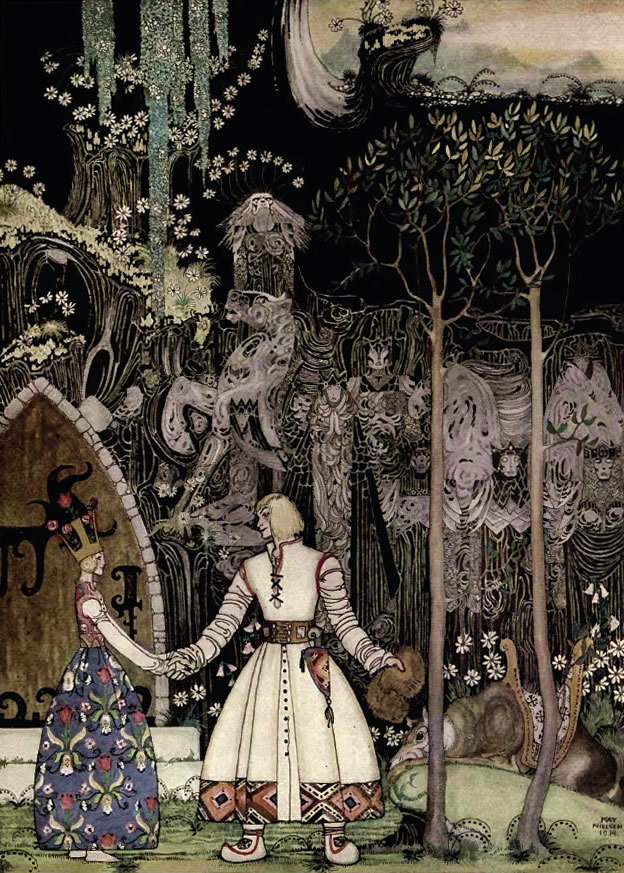 |
| Amanda Clark |
One of the terribly interesting things about fairy tales is that they’re not just for kids. I don’t mean this just in the sense that the lessons they teach us are applicable to situations we experience throughout our lives, or that the current trend in film and television intended for adults is the retelling of these same stories. What I mean is that the tales themselves follow you into adulthood.
When I was a kid, my family acquired a paperback collection of First Nations stories native to the Pacific Northwest. The only story I remember from the collection, long since donated, is one about a young woman taken from her family by a spirit bear, who climbs into her bed each night in the shape of a man under the cover of darkness. Several years later, I borrowed Edith Pattou’s East from the library and came to recognize elements of the spirit bear story in the more widely known “East of the Sun and West of the Moon.” A decade later, I finally purchased East, having just made the connection between the trope of ursine bridegrooms and Brave’s subversive replacement of the bewitched love interest with the transformed mother. Now, as part of what we probably should have called “Fairy Tale February” or something equally alliterative, I want to talk about the original story.
Technically, in order to talk about the original version of this tale, we would probably have to go all the way back to the Cupid and Psyche myth. However, that’s a bit of a tangent, so the myth is perhaps best left as recommended reading. What you need to know about it is merely that variations of this story have been told for thousands of years. In the same way that it keeps popping up in my life, it resurfaces across countries and centuries.
“East of the Sun and West of the Moon” is a Norwegian folk tale, collected by Peter Christen Asbjørnsen and Jørgen Moe in the mid-nineteenth century. It begins on a dark and stormy night, when a mysterious visitor knocks at the window of a house belonging to a poor husbandman and his family. The father answers the door, only to find a white bear asking that he give him his youngest, most beautiful daughter in exchange for wealth equal to their current poverty. To his credit, the husbandman tells the bear that he’s going to at least run the idea by his kid before he sends her off with a talking animal he’s known for five minutes. When she declines the offer, her father tells the bear to come back in a week, when her answer will have changed. He then uses this time to guilt her into agreeing. When the bear returns, she has her rags all packed up and ready to go.
 |
| H.J. Ford |
When her homesickness and loneliness become too overwhelming, she asks that the bear allow her to visit her family. He agrees, on the condition that she not speak with her mother alone, because doing so will bring both bear and girl great misery. Despite this ominous and unhelpfully vague warning, the girl eventually does speak to her mother, who suspects that the mystery man is, in fact, a mystery troll. She proposes a plan that involves the downright genius measure of lighting a candle and seeing who it is. Why this idea never occurs to the girl is not addressed. (Apparently some versions suggest that the candles in the castle cannot be used for this purpose. This is probably a later addition by a writer who didn’t want the girl to be dismissed as unforgivably stupid. We approve.)
When she returns to the castle, the girl puts her mother’s plan into action. She takes a look at the man and falls in love at first sight, as fairy tale maidens are wont to do. Again, in her defense, he’s apparently “the handsomest prince that eyes had ever beheld;” still, this doesn’t justify what she does next. Consumed with love for the sleeping prince, she kisses him, spilling three drops of tallow on his shirt and waking him up in the process. He then proceeds to freak out, telling her that if she had been able to unquestioningly accept a stranger into her bed every night for a year, he would have permanently shed the bear form he was cursed to wear during the day and they could have gotten married. Now that she has ruined everything, however, he must return to his stepmother’s realm, located east of the sun and west of the moon, where he will be forced to marry a troll princess with a distressingly long nose. Then he flounces, taking his castle with him and leaving the girl with her rags.
A major issue throughout this first half of the story is the matter of consent and control. Although the husbandman could easily have sent his daughter off with the bear without her consent, he explicitly asks for it. This act is complicated by the fact that he seems quite certain that he can change her mind, thereby proving that he doesn’t respect her decision. This issue arises again in the case of the bed companion. While this version of the story does not suggest that their encounters were in any way sexual, other versions certainly do; however, the Christian character that comes to define the girl later in the story seems to preclude the possibility of any premarital hanky-panky. Still, the bizarre situation in which a stranger shares a bed with you each night should, I think, set off a few more alarm bells than it does here. Perhaps the reason why it is not more of a problem is because the girl is so lonely. To stave off the intense loneliness she feels, she imagines the man as a probable friend instead of a potential threat.
The most intriguing treatment of the issue of consent and control outside of the pivotal tallow-spilling moment is the conflict between the girl’s respective allegiances to the bear and her mother. On the one hand, there is the pseudo-husband who extracts her promise not to speak to her mother alone. On the other, there is the mother who might offer some insight into the strange events at the castle. The girl must choose between ignorance and knowledge, between honouring her word and securing her safety. While we support the choice she makes, the story certainly doesn’t.
There is a fairly obvious parallel between “East of the Sun and West of the Moon” and “Sleeping Beauty.” In both stories, a kiss delivered to a sleeping person breaks a spell laid on the sleeper. However, whereas the prince kissing the sleeping princess is a necessary step on the road to happily-ever-after, the girl kissing the prince potentially annihilates her chances of marrying him and, in fact, forces him into the arms of another. While it is apparently beneficial to both parties when the man engages in non-consensual kissing, a woman taking the same action not only chases her man away but becomes a literal home wrecker.
 |
| Mercer Mayer |
That someone is the North Wind, who volunteers to take her to the land east of the sun and west of the moon, which is so far away that even blowing a leaf across the distance exhausted him. Still, the prospect of being dropped by a mythological figure while on the way to a possibly imaginary place doesn’t faze her. When the North Wind asks if she is afraid, she states that she isn’t, echoing her own sentiments upon initially leaving with the bear. What she seems to lack in intelligence, she more than makes up for in reckless bravery.
Unfortunately, she really lacks in intelligence. Once she arrives at the stepmother’s castle, she encounters her prince’s troll fiancée and trades her one of the three golden objects for entry to the prince’s room for the night. (Yes, it is just that dubious in the text.) However, in a delicious twist of irony, she can’t wake him up. So she makes the same deal again with the second object, and is apparently surprised when the prince is in an obviously enchanted or drugged sleep for the second time in a row. Finally, she offers the third and final object to the princess without thinking to add any stipulations to the deal such as, say, the prince being awake.
Luckily, help arrives in the form of a group of Christians who, through some particularly contrived coincidence, are staying (as captives) in the room next to the prince’s chamber. They warn the prince not to drink the troll princess’ sleeping draught, leaving him awake to reunite with the girl. Just in case you were wondering if the power balance would continue to work in the girl’s favour once the prince was back in the picture, it doesn’t. Instead, he greets her with an assurance that he’s thought of a plan to save himself, in which she is to have a starring role.
The next day, he sets a challenge for any woman hoping to marry him: wash the tallow out of his shirt and he’s yours, ‘cause domestic proficiency, a pretty face, and a willingness to sleep next to a stranger you’ve never seen for a year are all he’s looking for in a wife. While every other woman manages only to stain the shirt further, the girl merely has to dip it in water to restore it to whiteness. Although this was apparently a common requirement for marriage at the time in which the story is set, it is troubling to see it used as a triumphant, climactic moment, especially in light of the fact that the prince isn’t required to make a similar show of marital value.
 |
| Kay Nielsen |
A popular reading of this folk tale holds that it makes a case for the necessity of women’s obedience; women who disobey their husbands, even when such disobedience is in their own best interests, will suffer. I might offer another interpretation: that the story can be read -- and used, if it was adapted to suit modern sensibilities -- as a cautionary tale against keeping women in ignorance in unequal relationships. Ultimately, the careful cultivation of her ignorance leads to a bunch of dead trolls, a looted castle, and a marriage to a prince whose pretty face cannot possibly make up for the fact that his plan still leaves them stranded in a land that shouldn’t exist. That’s not exactly what I’d call a fairy tale ending.
Verdict: Strong Female Character™

I am not sure of this version of the tale leaves out some details or you do but I will try to explain them. Also the story is existent in both versions . Now let's start from the beginning:
ReplyDelete1. there are two sisters and the older sister is the one that refuses. Also the bear promises that the girl will be taken care off. He does not need a cook or a maid rather someone to keep her company.
2. the girls talks extensively with the bear and gets to care a lot about him.
3. She realizes that the one next to her is the bear as she sees him leave his fur and turn human. She sees him for a while before she goes to meet her mother.
4. In the original story what she wants is to have her human husband on the day too. In some versions they also have sex at night.
5. Her mother tells her to burn the skin in the original story and the bear/prince is awaken by the suffocating smoke resulted from this.
6. In the various versions she is helped by older women.It is the mothers of the sun, the moon and the winds that actually help her by talking to their children and convincing them to help her.
7. She resorts to the objects trick as she has no way to enter the palace.
8. After she finds the prince they still need to escape. It is not like the witch will let them leave without a fight.
Also you call her stupid but how smart can she be at 14-16 years?
Also this is the idea, reaching maturity by taking advices from wise old women.
I think you will like to read this:
http://www.povesti-pentru-copii.com/ion-creanga/povestea-porcului.html
ReplyDeleteIf you’ve been through a breakup recently--
Or if your man seems to be drifting further away each day...
Then it’s time to pull out all the stops.
Because 99% of the time, there is only 1 thing your man can hear that will change his mind and heart.
Here’s how: ==> Your Ex Won’t Be Able To Resist ]
And once you say this to him, or even send this simple phrase in a text message...
It will flip his world upside down and you will suddenly find him chasing you...
And even begging to be with you.
Here’s what I’m talking about:
Here’s how: ==> Why He Won’t Be Able To Live Without You ]
[SIGN OFF]